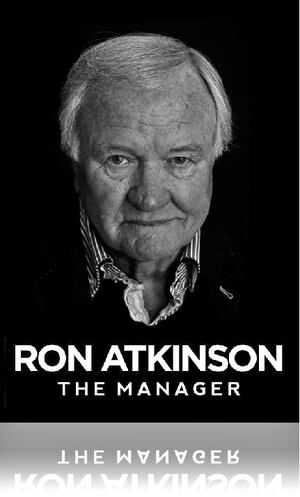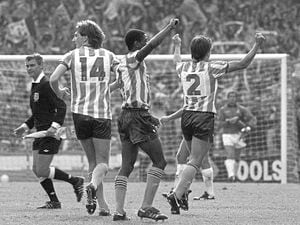Ron Atkinson: How Stan Cullis changed the world
Ron Atkinson's new book The Manager is being serialised on Expressandstar.com all this week. Today he tells of his apprenticeship at Wolves in the 1950s.
They were aliens. Not the aliens we would read about in the comic books of the 1950s but in their long leather coats they seemed to come from another world. They looked like Gods.
It was December 1954; I was 15, a ground-staff boy at Wolverhampton Wanderers watching Honved's players walk out on to the pitch, a pitch that I and the rest of the Wolves staff had done our best to turn into a bog.
I can still see Ferenc Puskas walking through the rain and the Molineux floodlights.
In theory it was a friendly but nobody was treating it as such. Wolves were the champions of England, Honved were the champions of Hungary. When Wolves came back from two goals down to win the Daily Mail carried a headline that proclaimed 'Hail Wolves, Champions of the World'. It was the game that inspired the European Cup.
We knew many of that Honved team had been the core of the Hungary side that had put six past England at Wembley and then scored seven against them in Budapest. We were standing in a little enclosure at Molineux called the Players' Pen.
Wolves ran out in what they called their 'Floodlit Kit' with big, billowing, luminous shirts. Then on came Honved in white shirts with two thin red hoops. The shirts were tight, everything about them was tight. They were two up in minutes. And then our work began to tell. It had been pouring down over the Midlands but the Wolves manager, Stan Cullis, had ordered the pitch soaked. We stood in the rain, hosing it and then rolling it. The Daily Mail said it resembled the surface of a four-day-old cattle show. As the rain came down, the Hungarians couldn't cope. Puskas tried his trademark drag-back and the ball became trapped in the mud. They literally became bogged down. Wolves, who ought to have been beaten by six, won 3–2.
Cullis had intended to use more than just ground-staff boys with hoses to beat the Hungarians. Wolves employed an analyst called Wing Commander Charles Reep, who argued that most goals resulted from three passes. It formed the basis of the theories that Graham Taylor was to use so successfully at Watford. Reep dominated Molineux to the extent that, if you played a square pass in your own half of the pitch, there would be trouble. If Stan Cullis saw it, he would go absolutely barmy.

Cullis believed in the power game but Wolves were not as crude as Wimbledon were to become, and in Peter Broadbent they had one of the best footballers England ever produced. Cullis was, nevertheless, very anxious to prove to us that the Hungarian way was not the way football should be played.
Before the game, Cullis took us all into the Molineux Hotel at the top of the ground to watch a film of the Hungarians beating England 6–3 at Wembley the year before. We analysed the first goal: Hungary score almost straight from the kick-off. There are half-a-dozen passes, Jimmy Dickinson tries to get his toe-end on to one of them, and turns it into a square pass. The ball is then played out to Nandor Hidegkuti,who whacks it in the net. Cullis turns round and says, 'There you go, three passes.'
Through my teenage eyes it looked like fifteen passes but, naturally, nobody in that room had the courage to say so. Cullis never received the recognition he deserved. He won the championship three times and the FA Cup twice. The irony was that he was a classic ball-playing centre-half who when he became a manager emphasised power and drive, but he ruled with a rod of iron.
The only person I ever saw stand up to him when I was on the staff at Wolves was Peter Broadbent. Even the internationals like Billy Wright were in absolute awe of him.
British footballers were so obviously the best
Foreign footballers are everywhere and the Premier League has far too many mediocre ones. What was once exotic and special has become mundane and ordinary. The argument is that they are cheaper than British footballers but I wonder how true that is.
Thinking of other players, Thierry Henry was phenomenal, Patrick Vieira was magnificent and, though he might have been an acquired taste, I did like David Ginola. Obviously there would have been days when as a manager he would have driven you up the wall but he had a beautiful way of playing.
And yet a generation-and-a-half before, there was this sense of wonder that foreign footballers existed at all when as a 14-year-old I sat in front of a nine-inch television screen that came complete with a magnifying glass.
I remember my dad urging me to go and watch Stanley Matthews because 'this will probably be his last season'. We duly went and he played on for another 10 years. He was the world's greatest player, although the world we knew comprised of England, Wales, Ireland and Scotland.
The one thing I cannot imagine Stanley Matthews in all his glory doing is playing with one lime-green boot and the other shocking-pink.
British footballers were of course the best in the world. It was so obvious it was never discussed.
TOMORROW: Atkinson on the Albion glory years and the Three Degrees
Broadbent was a fantastic footballer who had a body-swerve you wouldn't believe, and one day Cullis had a go because he wasn't tracking back and Peter just let him have it. He knew he was a player and he didn't need to be told how to play.
While the names of Busby and Shankly resonate across football, Stan Cullis's reputation disappeared outside the Black Country. Wolves sacked him very messily in 1964 and when he reappeared at Birmingham something was missing, something had gone. He never achieved anything much at St Andrew's and when he left Birmingham, he left the game completely.
But he was a visionary. The floodlit games Wolves staged against Honved, Spartak Moscow and Moscow Dynamo changed everything.
It sparked an idea. It was the first time any of us had seen foreign footballers up close, and Puskas and Kocsis would be among the greats, worthy of inclusion in any World XIs you could name. After the Hungarian Revolution in 1956 they were scattered throughout Europe.
Kocsis and Czibor went to Barcelona, Puskas to Real Madrid, where he scored hat-tricks in two European Cup finals and managed to be on the losing side in one of them.
Ron Atkinson: The Manager is available from www.decoubertin.co.uk/BigRon – the retail price is £20 but it is currently available for £17.99 on the website.





